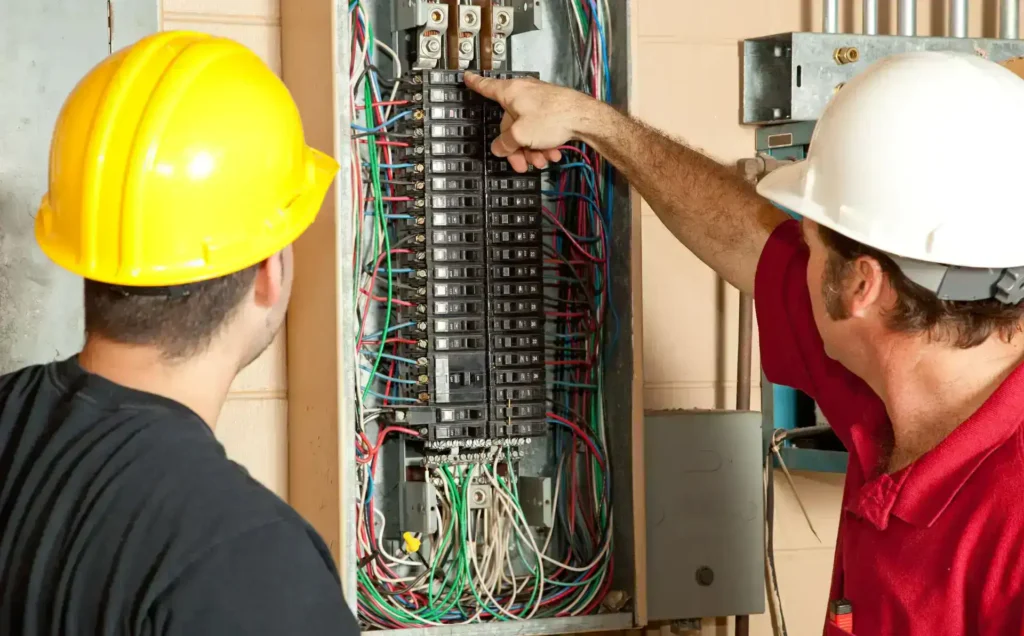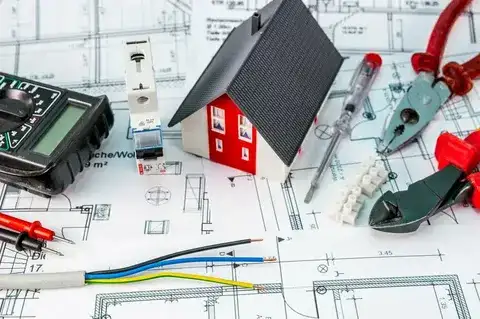When it comes to installing utilities or working on a home, running electricity from the road to the house is an important part. This is very intensive work in terms of planning, considering different factors, and budgeting. You certainly want to be aware of the cost entailed in running power from the road toward your house, whether you’re building a brand-new house out back in the country or just repairing an old one.

The cost to run electricity from the road to your house can vary highly based on several factors: distance, terrain types, and whether the installation will require underground or overhead power lines. This guide will break down the major points for you so you can prepare yourself for this key installation about electricity running from the road to your house.
Cost to wire a new house.
Wiring a home would cost somewhere around $4 to $9 per square foot; thus, for a 1,500-square-foot house to a 2,500-square-foot house, one would expect an overall price of anywhere from $6,000 to $22,500. This cost covers all the components, including labor, materials, and installation of the electrical systems, but note that various factors will affect the final price.
| Square feet | Average cost to rewire |
| 250 | $1,000 – $2,300 |
| 500 | $2,000 – $4,500 |
| 800 | $3,200 – $7,200 |
| 1,000 | $4,000 – $9,000 |
| 1,200 | $4,800 – $10,800 |
| 1,500 | $6,000 – $13,500 |
| 2,000 | $8,000 – $18,000 |
| 2,500 | $10,000 – $22,500 |
| 3,000 | $12,000 – $27,000 |
| 3,500 | $14,000 – $31,500 |
| 4,000 | $16,000 – $36,000 |
Factors That Impact the Cost of Running Electricity from Road to the House
1. Distance from the Road to Your House
The distance from the nearest highway to your domicile has a major bearing on the electrical costs. The farther a home is located from the power source, the costlier it will be. Utilities generally charge installation fees by the foot; hence, a long-distance installation means uphill costs.
- Short Distance (Under 100 feet): This means that if your house is close to the road, you may end up paying anywhere from $1,500 to $3,000 for overhead power lines.
- Long Distance (Over 500 feet): At the other end, for a property well back from the road, costs may be anywhere from $5,000 to $10,000 or more for overhead lines.
2. Type of Power Line Installation
When you run electricity to your house, you have the option of installing overhead or underground power lines. Each installation type comes with different costs, and your choice will significantly affect the overall price.
- Overhead Power Lines: In the installation of electricity in your home, electrical power can be overhead or underground. Of course, each mode has different costs of installation, which influence the overall price significantly.
- Underground Power Lines: Overhead lines are normally cheaper to install since digging is not involved; they are also, of course, much easier to set up. Overhead installation, for example, will range in price for shorter distances from $2,000 to about $4,000; however, for long distances, the price can exceed about $10,000 or much more.
3. Terrain and Accessibility
Depending upon the distance from road to the home, the terrain can considerably raise or lower the costs of routing electricity. Rocky, hilly, or otherwise difficult terrain increases all sorts of complications in the way of installation and therefore requires specialized equipment and increased labor costs.
- Rugged Land or Hills: Significant costs might arise due to special equipment required to handle the terrain.
- Easier Terrain: Conversely, a flat land site that is easily accessible will see reduced costs due to the faster installation process and fewer resources involved.
4. Permits and Inspection Fees
Before starting any electrical installation, you will need permits from your local authority or utility company. Permits usually cost between $50 and $350, depending on how complicated the project is and where you are.
You may also need to pay for inspections required for the work to comply with local building codes and safety standards. Costs for inspections vary widely, usually in the $100 to $300 range. However, it also varies considering local regulations and the size of the installation.
Labor Costs
During the rough-in phase, wires are pulled through the walls and junction boxes are set in place. The labor involved in this phase ranges from $50 to $130 per man-hour, with a period of several days that depends entirely on the size of your house.
Different States Cost to Run Electricity from Road to the House
The cost for electrical installation from the public road to a house varies from one state to another. Costs are determined by factors such as labor, permit approval, and charges by the utility company in the different states. Below is a cost table showing the average range across different states in the U.S.
| State | Cost for Overhead Lines |
| California | $3,000 – $7,000 |
| Texas | $2,000 – $5,000 |
| Florida | $2,500 – $6,000 |
| New York | $3,000 – $6,500 |
| Georgia | $2,500 – $6,000 |
| Illinois | $2,500 – $5,500 |
| North Carolina | $2,000 – $5,000 |
| Michigan | $3,000 – $6,500 |
| Colorado | $2,500 – $5,000 |
Breakdown of Electrical Costs by Room
Every room needs a unique set of electrical requirements. Below are the estimated costs for different rooms to be wired in a home:
| Room | Square feet | Average cost to wire |
| Kitchen | 100 – 200 | $400 – $1,800 |
| Bedroom | 130 – 230 | $520 – $2,100 |
| Bathroom | 40 – 150 | $160 – $1,400 |
| Living room | 200 – 450 | $800 – $4,100 |
| Basement | 500 – 1,500 | $2,000 – $13,500 |
| Garage | 288 – 576 | $1,200 – $5,200 |
| Shed | 50 – 450 | $200 – $4,100 |
| Shop or metal building | 1,200 – 5,000 | $1,500 – $7,800+ |
The kitchen and living room tend to be the most expensive rooms to wire due to the number of appliances and electrical outlets needed.
Additional Costs: Service Panel and Meter Installation
There are several extra costs involved along with the main concern of taking the power home.
1. Service Panel Installation
The service panel must deliver the electricity to your home. While this is done, a new house or renovation of the whole electrical system will cost you around $500 to $2,500 dollars depending on the amperage and complexity of the installation.
2. Electrical Meter
It measures the electrical energy consumed by a house or a company. It costs from 300 to 1000, depending on the amount of electricity you consume.
3. Connection Fees
Also, at a time when the whole installation has been completed, utility providers normally charge a connection fee to link the property to the grid officially.
4. Trenching Costs (Underground Lines)
This is the main cost factor for underground lines. Their trenching typically costs anywhere from 1 to 5 dollars per meter, depending on the conditions of the soil and the distance it requires running through.
Tips for Saving on Installation Costs
However, since electricity costs are rapidly increasing, there are ways to cut the cost of charging electricity:
- Choose Overhead Lines: Almost anything overhead line will be less expensive to install than underground lines. If you do not have particular needs for underground lines, overhead power lines can save you thousands.
- Get Multiple Quotes: Get your quotes done by several electricians and utility companies. There is a price variation; hence, comparison could land you at a better deal with one company over another.
- Clear the Path for Installation: Clearing trees/debris from the path of utility poles will help reduce labor costs within that area if the lines are overhead.
Conclusion
The cost of running electricity from the road to your home is a consideration for anyone constructing a new home or installing utilities on a rural property. The cost can be quite high based on the distance from the road, the installation type, and where you live. On average, you can expect to pay between $1,500 and $15,000, with underground lines being the most costly.
By knowing the various factors in this process and the expense of each, you’ll be able to make a better choice and budget accordingly. Get more than one estimate from electricians and utility companies, and weigh the advantages and disadvantages of overhead versus underground lines to discover the most suitable option for your residence.
FAQs
1. What factors affect the cost of running electricity to a house?
The factors above include distance from the exhaust road, if installation is underground or overhead, terrain, and local permit fees.
2. How much does it cost to run electricity from the road to a house?
Usually, costing is between $1,500 and $15,000, depending on these major variables: distance, installation type, and site condition.
3. Is underground electricity installation more expensive than overhead lines?
Yes, underground installation is comparatively more expensive due to the cost of trenching and special materials that usually go beyond overhead line systems.
4. How long does it take to run electricity to a house?
It can take several weeks to several months, depending on the complexity of the installation and the distance from the utility pole.
5. Can I install my electrical line from the road to my house?
No, the installation of electrical lines generally needs to be carried out by a qualified electrician due to safety regulations and local construction codes.


